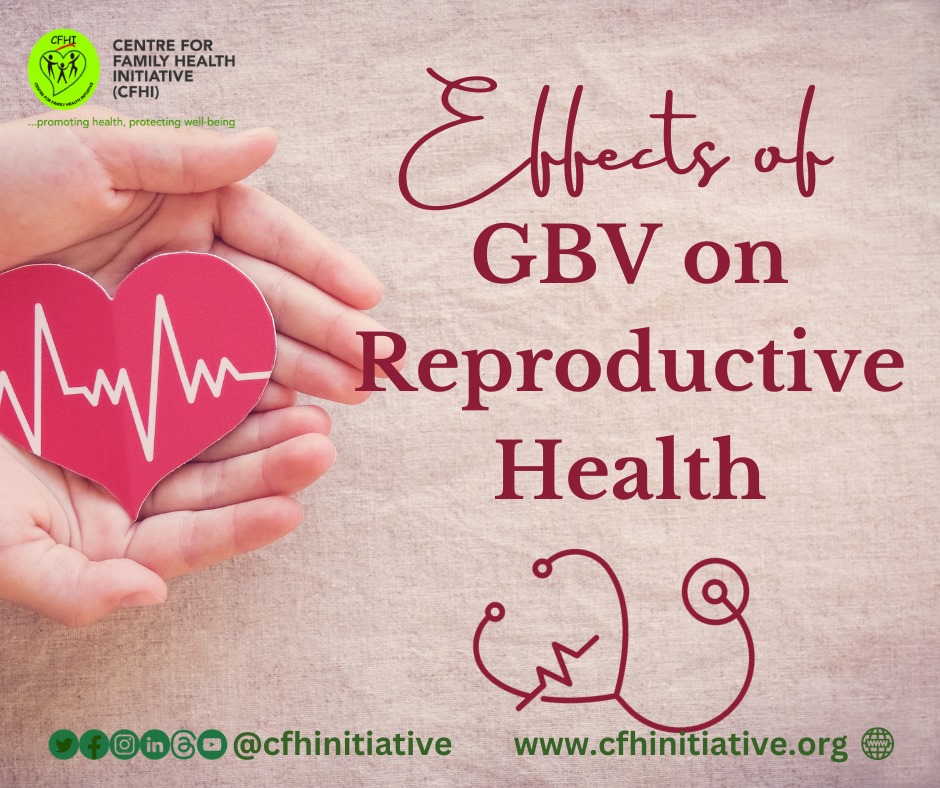Gender-Based Violence (GBV) is a pervasive human rights violation that affects millions of individuals worldwide, with significant and far-reaching consequences. Among its numerous adverse effects, GBV has a profound impact on reproductive health, causing physical, psychological, and social harm to survivors. Understanding these effects is crucial for addressing the broader issue of GBV and safeguarding the reproductive health and rights of those affected. Here, we explore the various ways in which GBV can affect reproductive health:
1. Physical Injuries and Complications: Physical violence, such as sexual assault or intimate partner violence, can lead to immediate injuries, including genital trauma. These injuries can result in long-term complications, such as chronic pain, sexually transmitted infections (STIs), and even infertility in some cases. Survivors may also be at a higher risk of unwanted pregnancies due to a lack of control over contraceptive choices.
2. Sexual and Reproductive Coercion: GBV often involves reproductive control, where survivors are coerced into unwanted pregnancies or abortions. Perpetrators may sabotage contraception methods or force survivors into sexual acts without their consent. This coercion can lead to unwanted pregnancies, unsafe abortions, and emotional distress.
3. Psychological Trauma: Survivors of GBV commonly experience psychological trauma, which can have a profound impact on their reproductive health. Post-Traumatic Stress Disorder (PTSD), depression, anxiety, and other mental health conditions can disrupt normal reproductive functioning, affecting menstrual cycles and sexual health.
4. Substance Abuse: Some survivors turn to substance abuse as a coping mechanism to deal with the psychological and emotional trauma caused by GBV. Substance abuse can result in risky sexual behaviors, including unprotected sex, which increases the risk of STIs and unintended pregnancies.
5. Delayed or Avoided Healthcare: Stigma, shame, and fear often prevent survivors from seeking timely medical care and support. Delayed or avoided healthcare can result in untreated injuries, untreated STIs, and complications during pregnancy or childbirth.
6. Reproductive Health Inequities: GBV disproportionately affects marginalized and vulnerable populations, exacerbating existing health inequities. Survivors who face additional layers of discrimination based on factors like race, ethnicity, socioeconomic status, or sexual orientation may encounter further challenges in accessing appropriate reproductive healthcare.
7. Impact on Mother-Child Relationships: If GBV occurs during pregnancy, it can have detrimental effects on both the mother and the developing foetus. Violence during pregnancy is associated with adverse birth outcomes, such as low birth weight and preterm birth. Furthermore, the psychological stress experienced by pregnant survivors can affect the bond between mother and child.
8. Barriers to Family Planning: Survivors of GBV may encounter obstacles to accessing family planning services. They may lack autonomy in making decisions about contraception or face difficulties in negotiating safe sex practices with their partners, resulting in increased risks of unintended pregnancies.
Addressing the effects of GBV on reproductive health requires a comprehensive approach. Efforts should include:
– Awareness and Education: Promoting awareness about GBV and its consequences on reproductive health to encourage survivors to seek help and support.
– Healthcare Services: Ensuring that healthcare providers are trained to recognize and respond to GBV, offering sensitive and confidential care to survivors.
– Counseling and Mental Health Support: Providing survivors with access to mental health services to address trauma and psychological distress.
– Prevention and Advocacy: Implementing policies and programs aimed at preventing GBV and advocating for gender equality.
Speak Wednesday is an initiative of CFHI to address issues around gender-based violence and gender bias.
#SpeakWednesday #GenderEquality #GenderDiscrimination #Women’sFinance


